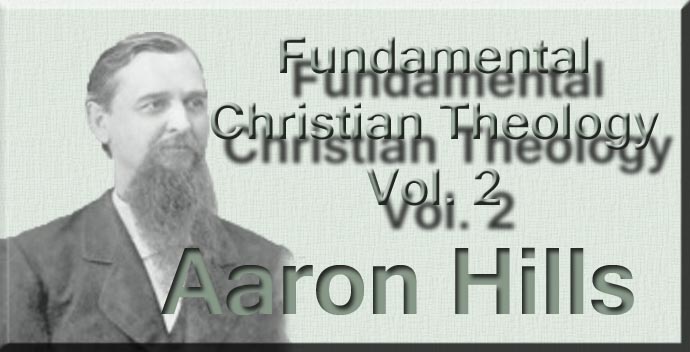
Fundamental Christian Theology, Vol. 2
By Aaron Hills
Part V - Soteriology
Chapter 0
|
The term Soteriology is from two Greek words - Soteria and Logos, and means the doctrine of salvation. The doctrine involves two great facts--an atonement for sin, and a salvation from sin. All this comes through the Savior, Jesus Christ, whose nature, personality and incarnation we have discussed in previous chapters. The unfolding of this subject involves the extended discussion of conflicting systems of theology. For we must not only consider the fact of an atonement, but also the nature of it, and why it was needed, and what were its effects and for whom it availed. In any logical system of theology doctrine must accord with doctrine. Its doctrine of atonement must be vitally related with all cognate doctrines, and all must be harmonious. And, moreover, all true Christian doctrines and systems of doctrine must be Scriptural. As other leading doctrines of a system of theology are true or false, so must the doctrine of the atonement be true or false. Now we are confronted with three great systems of theology all purporting to be biblical. If the leading doctrines of the Socinian or Unitarian theology be true and Scriptural, then so is also its moral influence theory of atonement. If its doctrine of man and Christ be true, then it needs and will admit of no other theory of Atonement. Again if the cardinal doctrines of Calvinism be true, its satisfaction theory of Atonement is true. It is an integral part of the system, and dovetails perfectly into the other doctrines. They all stand or fall together. And, again, if the cardinal doctrines of the Arminian system, wherein it differs from Calvinism, be true, then its doctrine of Universal Atonement, sufficient for all, but provisory in its efficacy, and conditional in its benefits, must be true also. The two systems of thought are mutually exclusive. Only one can be either Scriptural or true in their distinctive doctrines or their theory of Atonement. Therefore we cannot, if we would, avoid examining critically these conflicting systems of theology. |
|
 |
 |
|
|
|
-
Site Navigation
 Home
Home What's New
What's New Bible
Bible Photos
Photos Hiking
Hiking E-Books
E-Books Genealogy
Genealogy Profile
Free Plug-ins You May Need
Profile
Free Plug-ins You May Need
 Get Java
Get Java.png) Get Flash
Get Flash Get 7-Zip
Get 7-Zip Get Acrobat Reader
Get Acrobat Reader Get TheWORD
Get TheWORD